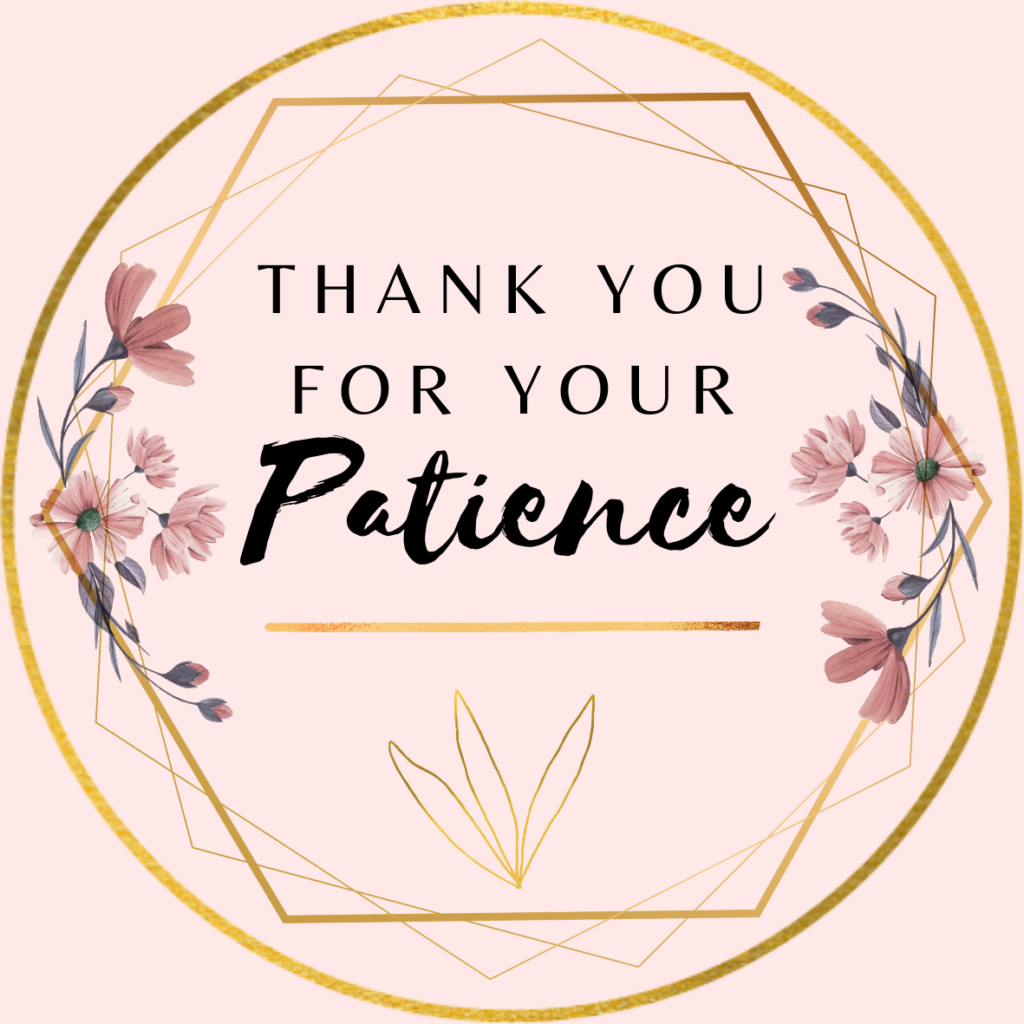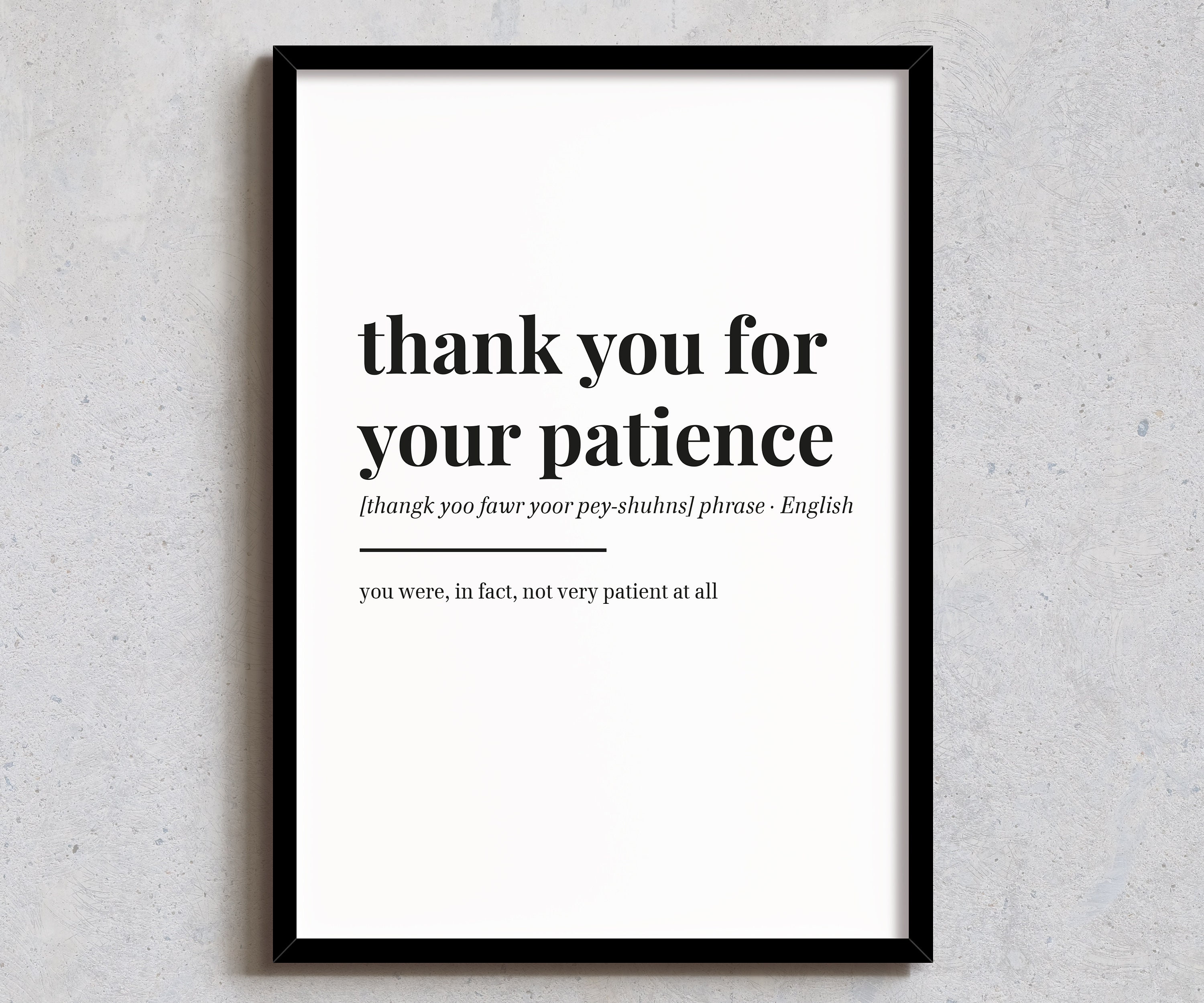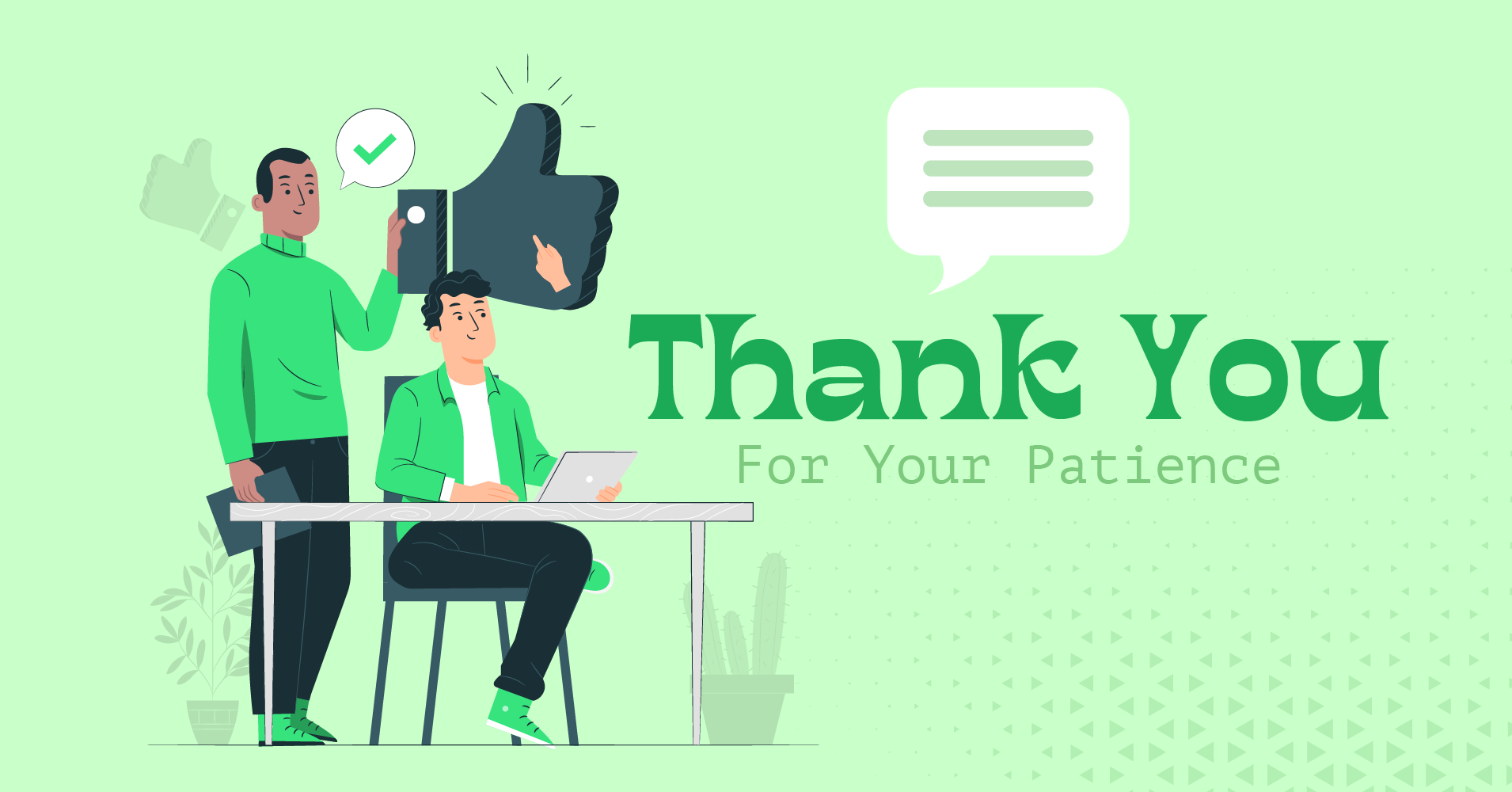Thank you for your patience. We appreciate your understanding and support during this time.
Patience is a vital quality in today’s fast-paced world. Whether you’re waiting for a service, product, or resolution to an issue, having patience can make a significant difference. It allows for smoother interactions and helps in achieving better outcomes. Businesses and individuals alike benefit from a calm and composed approach.
Your patience reflects your maturity and fosters better relationships. It also sets a positive example for others. Practicing patience can reduce stress and improve overall well-being. In a society that values instant gratification, taking a moment to breathe and wait can be incredibly powerful. Thank you for showing patience and contributing to a more considerate and efficient environment.

Power Of Gratitude
Gratitude is a powerful emotion. It can transform your life. Saying “Thank You for Your Patience” is a simple act. Yet, it holds immense power. It can change your mood and improve relationships. Gratitude can make you happier and healthier.
Emotional Benefits
Expressing gratitude can boost your mood. It helps you feel more positive. When you thank someone, you feel good inside. It also makes the other person feel valued. This creates a bond between you and them.
Gratitude reduces feelings of stress. It helps you focus on the good things. This can make you feel calmer and more content. It can also improve your overall emotional well-being.
Psychological Impact
Gratitude has a strong psychological impact. It can improve your mental health. People who practice gratitude are less likely to be depressed. They also feel more satisfied with their lives.
Saying “Thank You for Your Patience” can help build resilience. It makes you stronger in the face of challenges. Gratitude helps you see the positive side of things. This can lead to a more optimistic outlook on life.
Building Stronger Bonds
Expressing gratitude for someone’s patience can strengthen relationships. It shows you value their time and understanding. This simple act can transform relationships positively.
Trust And Respect
Saying “thank you for your patience” builds trust. People feel appreciated and respected. This helps them to trust you more. Trust is the foundation of any strong relationship.
Respect grows when you acknowledge someone’s patience. Respect creates a positive environment. It encourages open communication and collaboration.
Mutual Appreciation
Mutual appreciation fosters stronger bonds. It creates a cycle of gratitude. When you appreciate someone’s patience, they feel valued. They are more likely to appreciate you in return.
This mutual appreciation strengthens relationships. It builds a supportive and positive atmosphere. Everyone feels more connected and valued.
Benefits of Building Stronger Bonds
| Benefit | Description |
|---|---|
| Improved Communication | Open, honest, and more effective communication. |
| Greater Trust | Increased trust leads to better collaboration. |
| Enhanced Respect | More respect creates a positive environment. |
Enhancing Communication
Effective communication is essential for building strong relationships. A simple “Thank You for Your Patience” can go a long way. It shows you value the other person’s time and understanding.
Active Listening
Active listening involves fully concentrating on what someone is saying. It shows respect and ensures you understand the message. Here are some key points:
- Maintain Eye Contact: This shows you are engaged.
- Nod Occasionally: It signals you are following the conversation.
- Avoid Interrupting: Let the speaker finish their thoughts.
- Ask Clarifying Questions: This ensures you understand correctly.
Expressing Thanks
Saying “Thank You” is powerful. It acknowledges the person’s effort and time. Here are some ways to express thanks effectively:
- Be Specific: Mention what you are thankful for.
- Be Sincere: Genuine gratitude is always appreciated.
- Use Their Name: Personalize your thanks for a stronger impact.
- Follow Up: Send a thank-you note or email later.
Enhancing communication through active listening and expressing thanks can significantly improve relationships. It shows you value the other person’s time and efforts. Start practicing these tips today to make a positive impact.
Conflict Resolution
In every relationship, conflicts are bound to happen. Resolving these conflicts can strengthen bonds. Saying “Thank You for Your Patience” shows respect and understanding. Let’s explore some ways to achieve conflict resolution effectively.
Acknowledging Efforts
Start by recognizing the other person’s effort. Acknowledgment can go a long way. It shows you appreciate their patience and willingness to resolve the issue.
- Say “I see you’ve been patient.”
- Express gratitude: “Thank you for waiting.”
- Recognize actions: “I appreciate you listening.”
Finding Common Ground
Finding common ground is crucial in resolving conflicts. It helps both parties feel heard and valued. Here are some steps to find that common ground:
- Identify shared goals: “We both want a solution.”
- Discuss mutual interests: “We both care about this project.”
- Agree on next steps: “Let’s work on this together.”
Using these simple steps can make a big difference. Remember, patience and acknowledgment are key. Thanking someone for their patience can turn a conflict into a collaboration.
Creating Positive Environments
Creating positive environments can transform our interactions. It fosters understanding and patience. This blog post explores how we can cultivate such spaces.
Supportive Atmosphere
A supportive atmosphere is essential for positive environments. It encourages open communication and reduces stress.
- Listen actively to others.
- Show empathy in conversations.
- Provide constructive feedback.
Active listening involves focusing on the speaker. Nod, smile, and make eye contact. Empathy means understanding someone’s feelings. It helps build trust. Constructive feedback is specific and kind. It helps improve and grow.
Encouraging Words
Encouraging words can uplift and motivate. They create a positive vibe.
- Say “Thank you for your patience.”
- Express appreciation often.
- Give compliments sincerely.
“Thank you for your patience” shows respect. It acknowledges someone’s time and effort. Appreciation fosters goodwill. Compliments boost confidence. They make people feel valued.
| Action | Impact |
|---|---|
| Active Listening | Builds Trust |
| Empathy | Encourages Open Communication |
| Constructive Feedback | Facilitates Growth |
| Thanking for Patience | Shows Respect |
| Appreciation | Fosters Goodwill |
| Compliments | Boosts Confidence |

Gratitude In Daily Life
Expressing gratitude can transform our daily lives. A simple thank you can uplift someone’s day. Showing appreciation for patience can build stronger connections. Gratitude in daily life creates a positive atmosphere around us.
Small Gestures
Small gestures can have a big impact. A smile or a kind word can show gratitude. These little actions make others feel valued. Examples of small gestures include:
- Writing a thank-you note
- Offering a helping hand
- Giving a sincere compliment
These gestures take little time but mean a lot. They show that you notice and appreciate the efforts of others.
Consistent Practice
Practicing gratitude consistently can change your outlook. Make it a habit to thank people every day. This practice can be simple but powerful. Here are some ways to practice gratitude consistently:
- Keep a gratitude journal
- Set reminders to say thank you
- Reflect on positive interactions
These practices help embed gratitude in your daily routine. They make you more aware of the good things around you.
| Small Gestures | Consistent Practice |
|---|---|
| Writing a thank-you note | Keep a gratitude journal |
| Offering a helping hand | Set reminders to say thank you |
| Giving a sincere compliment | Reflect on positive interactions |
Incorporating these habits can make a big difference. By showing gratitude, you create a more positive environment for everyone.
Impact On Mental Health
Saying “Thank you for your patience” can have a significant impact on mental health. It shows appreciation and respect. This simple act can reduce stress and boost happiness.
Reducing Stress
Waiting can be stressful. When someone thanks you for your patience, it can ease tension. It reminds you that your waiting is valued. This acknowledgment can make stressful situations more bearable.
Consider a busy doctor’s office. If the staff thanks you for your patience, it can make the wait feel shorter. You feel seen and appreciated.
In customer service, a “thank you for your patience” can turn a negative experience into a positive one. It shows that the company values your time.
This simple phrase can reduce stress in various situations. It can make you feel calm and respected.
Boosting Happiness
Feeling appreciated can boost happiness. Acknowledging someone’s patience is a form of gratitude. Gratitude is linked to happiness and well-being.
When someone thanks you for your patience, it can make you smile. It creates a positive connection between you and the other person.
In workplaces, this can improve relationships. Colleagues who appreciate each other’s patience work better together. This leads to a happier work environment.
Gratitude can also improve personal relationships. Thanking family members for their patience can strengthen bonds. It shows you value their time and effort.
Overall, showing gratitude for patience can lead to a happier and more positive life.
Strengthening Family Ties
Thanking family members for their patience helps build stronger relationships. This simple act can deepen bonds and create lasting memories. Let’s explore how patience can strengthen family ties.
Shared Moments
Spending time together creates shared moments. These moments strengthen family ties. Simple activities like cooking or playing games can bring joy. Laughter and fun help families grow closer. Shared moments build trust and understanding.
| Activity | Benefit |
|---|---|
| Cooking together | Builds teamwork |
| Playing games | Encourages bonding |
| Storytelling | Enhances communication |
Expressive Love
Expressing love is crucial in families. Saying “thank you for your patience” shows care. It can make family members feel valued and appreciated. Simple words can have a big impact.
- Write a note of gratitude
- Give a warm hug
- Say kind words often
Expressive love fosters a positive environment. It encourages family members to be more patient and understanding.
Workplace Relationships
Building strong workplace relationships is key for a happy work environment. Saying “thank you for your patience” can strengthen these bonds. This simple phrase can have a big impact on team collaboration and employee morale.
Team Collaboration
Team collaboration thrives when members feel appreciated. Thanking a team member for their patience shows respect. It creates a positive atmosphere where everyone feels valued. This fosters open communication and trust among team members.
Here are some benefits of expressing gratitude:
- Encourages a cooperative spirit
- Reduces conflicts
- Boosts problem-solving abilities
Employee Morale
High employee morale leads to better productivity. A simple “thank you for your patience” can uplift spirits. It shows that you recognize their efforts and time.
| Actions | Effects on Morale |
|---|---|
| Expressing Gratitude | Improves job satisfaction |
| Showing Patience | Reduces stress levels |
| Acknowledging Efforts | Increases motivation |
Remember, a few kind words can make a big difference. Showing appreciation boosts morale and enhances workplace relationships.

Frequently Asked Questions
Why Is Patience Important In Daily Life?
Patience helps manage stress and improves decision-making. It fosters better relationships and enhances personal growth. Cultivating patience leads to a more fulfilling life.
How Can I Develop More Patience?
Practice mindfulness and deep breathing. Set realistic expectations and take breaks when needed. Gradually, patience will become a habit.
What Are The Benefits Of Being Patient?
Patience reduces stress, improves relationships, and enhances problem-solving skills. It leads to better mental and emotional health.
How Does Patience Impact Mental Health?
Patience reduces anxiety and stress. It promotes a positive mindset and emotional resilience. Patience contributes to overall mental well-being.
Conclusion
We appreciate your patience and understanding. Your support helps us improve and grow. Thank you for sticking with us. We are committed to delivering a better experience. Stay tuned for more updates and improvements. Your feedback is always welcome. Thank you once again for your patience.

Leave a Reply
You must be logged in to post a comment.